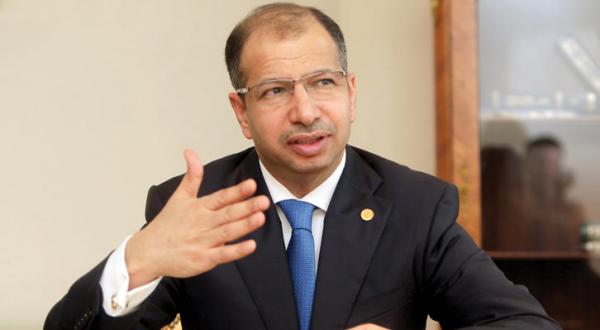Riyadh- Iraqi Parliamentary Speaker Dr.Salim Abdullah al-Jabouri considered that citizens and the area residents ought to participate at the operations for liberating Iraqi zones from ISIS dominance. The area domiciles have a priority atop the Popular Mobilization Forces (PMF) to freeing their land.
In an interview with Asharq Al-Awsat newspaper, and after meeting with the Custodian of the Two Holy Mosques King Salman bin Abdulaziz in Riyadh on Tuesday, al-Jabouri stated that bilateral affairs between the two countries were an issue discussed at the meeting. He added that Iraq’s need for fellow Arab support to counter fight terrorism was among the prominent topics conferred on with King Salman.
Al-Jabouri stated that the case on imprisoned Saudis who have served their verdict was also brought up, and confirmed that he personally is concerned with its developments.
On Hezbollah being recognized a terrorist organization, al-Jabouri stated that his country respect the League of Arab States’ decision, even though Iraq had abstained from voting the matter.
The Iraqi Army is advancing in freeing more land, however, is continually being hurdled with planted minefields in cities.
Al-Jabouri did not comment or explain the incident of Iranian Revolutionary Guard Corps (IRGC) being both present and active on Iraqi grounds. Yet, any party fighting ISIS in Iraq will not be allowed to gain political influence or ground dominance, he declared.
Here is a selected set of questions along with the Parliamentary Speaker al-Jabouri’s responses:
* How do you read into Saudi-Iraqi affairs, especially after Riyadh opening its embassy in Baghdad?
An embassy being present is a factor that plays a positive role. It represents a great indicative that there are both openness and desire for nurturing a special relationship, despite that the current state of affairs require further expansion than what they are at the moment.
* How would you elaborate on the increased efforts spent by the Saudi embassy in Iraq on keeping up with the files on Saudis who have finished serving their sentences, however, are still detained by Iraqi authorities?
I have taken-in the case, since the time I had served at chairing the human rights committee at the parliament. In light of my work, we have arrived at striking a deal with many nations, including both Kuwait and Iran, we are hoping for signing a warrant on exchanging prisoners between Iraq and Saudi Arabia. The first steps and conditions have been outlined. We are very concerned for the process to proceed as soon as possible, because the issue is mainly made on humanitarian argument and not sectarian factors. A part of our efforts are spent on settling the suit quickly, and I am personally attending the finishing on the file on signing and supporting the warrant on prisoner exchange.
* In Iraq, the case on freeing Ramadi has reached what stage?
–
In our previous visit to Ramadi, we got to see the scale of damage done, and advancement is ongoing. As for Anbar, 80 percent of the governorate has been liberated. The zones left are the areas ISIS militants are escaping to, the strongholds can be deterred with persistent military operations. However, we cannot provide a definite time for full liberation. Yet, I must point out that the Iraqi Army is carrying on with freeing regions, and is moving to the second stage of refugees returning to their home and stability. The process of returning is obstructed with the planted minefields in the cities. Mine neutralization needs to be conducted by specialist so that the Iraqi Army is not subjected to further loss.

